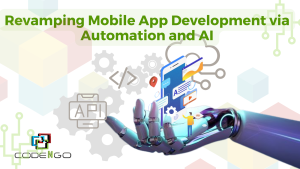Automation and AI have triggered an unprecedented evolution in the realm of mobile app development, driven by the escalating expectations of users. To meet these ever-growing demands and to introduce inventive, top-tier applications, developers are pivoting towards the realms of automation and artificial intelligence.
by Liz Rustia
In the following discourse, we embark on an exploration of the potent transformation brought forth by AI-fueled app development automation. This journey takes us through the advantages it offers, the hurdles it presents, and the promising vistas it unveils for the industry’s future.
The Power of Automation in App Development

App development is a complex process that involves numerous stages, from ideation and design to coding and testing. Automation, driven by AI technologies, streamlines these stages and significantly accelerates the development lifecycle. Here’s how:
- Code Generation: Writing code is a time-consuming task prone to errors. AI-powered tools can automatically generate code snippets based on predefined templates and guidelines. This not only saves developers time but also reduces the likelihood of introducing bugs.
- Design Assistance: AI algorithms can analyze design trends and user preferences to suggest layouts, color schemes, and UI elements. This ensures that apps are visually appealing and aligned with current design standards.
- Testing and Quality Assurance: Automation tools can perform rigorous testing, running through various scenarios and identifying bugs, performance bottlenecks, and compatibility issues. This leads to higher-quality apps and faster debugging.
- Content Management: For content-heavy apps, AI can automate content curation and distribution. It can analyze user behavior to determine which content is most relevant and present it in a personalized manner.
- Localization and Translation: Expanding an app’s reach to global audiences requires localization. AI-powered translation tools can automatically translate app content, making it accessible to users in different languages.
- Deployment and Updates: Automating the deployment process ensures that new features and updates are seamlessly integrated into the app without disrupting user experiences.
Challenges and Considerations
While automation and AI offer transformative benefits, they also come with challenges that developers must address:
- Quality of Training Data: AI algorithms rely on training data to learn patterns and make predictions. Ensuring high-quality, unbiased training data is essential to prevent algorithmic biases and inaccuracies.
- Privacy and Security: Many apps handle sensitive user data. Implementing AI features, such as personalization, requires robust security measures to safeguard user privacy.
- Complexity and Learning Curve: Integrating AI into the development process might require developers to acquire new skills and knowledge. Overcoming the learning curve associated with AI technologies is crucial.
- Maintenance and Updates: AI models need continuous training and refinement to stay effective. This ongoing maintenance effort must be factored into the development strategy.
The Future Landscape
The marriage of automation and AI with mobile app development is reshaping the industry’s landscape. As AI technologies continue to advance, we can expect the following trends:
- Hyper-Personalization: Apps will deliver experiences tailored to individual users, driven by AI’s ability to analyze user behavior and preferences.
- Enhanced User Engagement: AI-powered chatbots and virtual assistants will provide seamless user support and engagement, driving higher user satisfaction.
- Faster Time-to-Market: Automation will expedite app development, enabling developers to release products more quickly without compromising quality.
- Cross-Platform Development: AI-driven tools will facilitate the creation of apps that seamlessly run on multiple platforms, reducing development efforts.
- AI-First Apps: Developers will increasingly design apps centered around AI capabilities, creating entirely new and innovative user experiences.
Automation and AI are reshaping the mobile app development landscape, empowering developers to create sophisticated, user-centric applications faster and more efficiently. While challenges exist, the benefits of automation in terms of accelerated development, improved app quality, and enhanced user experiences are undeniable. As the field of AI continues to evolve, developers who embrace these technologies are poised to lead the way in delivering the next generation of innovative mobile applications.
Share this article on